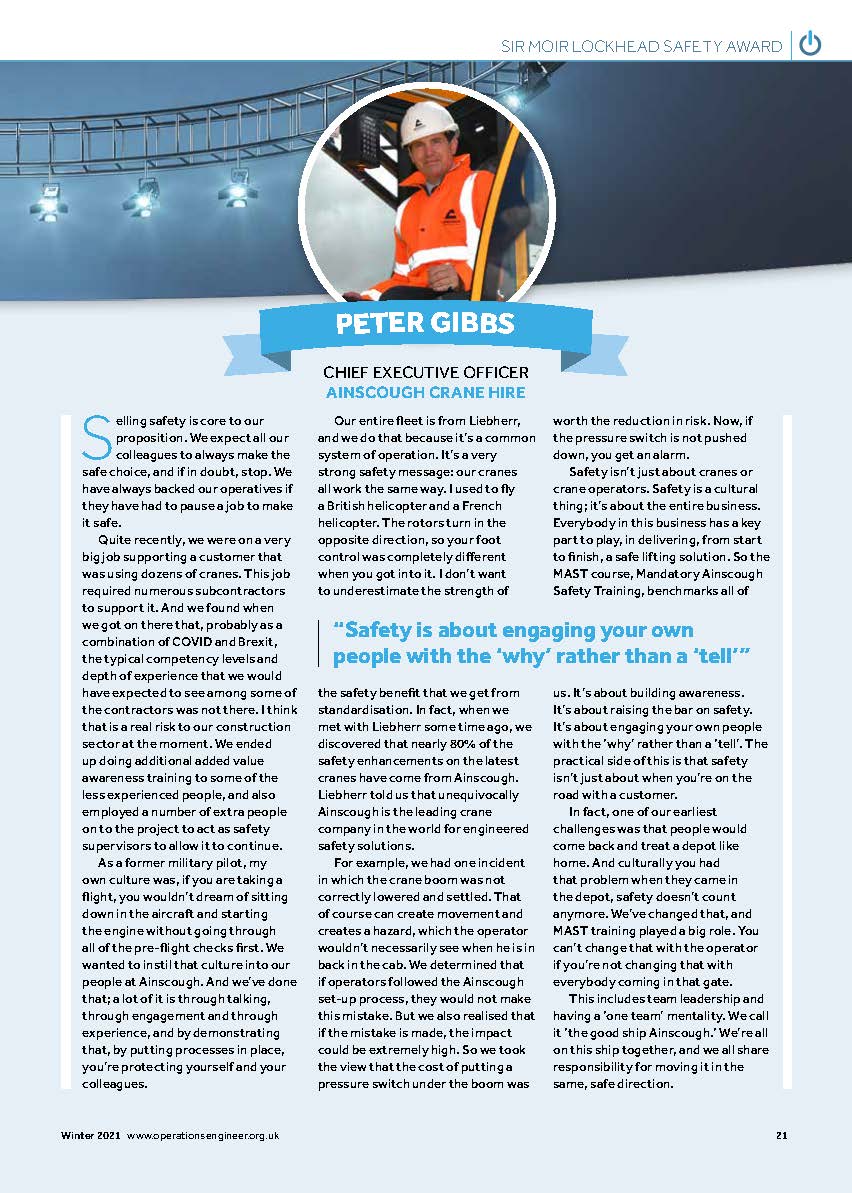 Back
Back

Selling safety is core to our proposition. We expect all our colleagues to always make the safe choice, and if in doubt, stop. We have always backed our operatives if they have had to pause a job to make it safe.
Quite recently, we were on a very big job supporting a customer that was using dozens of cranes. This job required numerous subcontractors to support it. And we found when we got on there that, probably as a combination of COVID and Brexit, the typical competency levels and depth of experience that we would have expected to see among some of the contractors were not there. I think that is a real risk to our construction sector at the moment. We ended up doing additional added value awareness training with some of the less experienced people, and also employed a number of extra people on to the project to act as safety supervisors to allow it to continue.
As a former military pilot, my own culture was, if you are taking a flight, you wouldn’t dream of sitting down in the aircraft and starting the engine without going through all of the pre-flight checks first. We wanted to instill that culture into our people at Ainscough. And we’ve done that; a lot of it is through talking, through engagement, and through experience, and by demonstrating that, by putting processes in place, you’re protecting yourself and your colleagues.
Our entire fleet is from Liebherr, and we do that because it’s a common system of operation. It’s a very strong safety message: our cranes all work the same way. I used to fly a British helicopter and a French helicopter. The rotors turn in the opposite direction, so your foot control was completely different when you got into it. I don’t want to underestimate the strength of the safety benefit that we get from standardisation. In fact, when we met with Liebherr some time ago, we discovered that nearly 80% of the safety enhancements on the latest cranes have come from Ainscough. Liebherr told us that unequivocally Ainscough is the leading crane company in the world for engineered safety solutions.
For example, we had one incident in which the crane boom was not correctly lowered and settled. That of course can create movement and creates a hazard, which the operator wouldn’t necessarily see when he is in back in the cab. We determined that if operators followed the Ainscough set-up process, they would not make this mistake. But we also realised that if the mistake is made, the impact could be extremely high. So we took the view that the cost of putting a pressure switch under the boom was worth the reduction in risk. Now, if the pressure switch is not pushed down, you get an alarm. Safety isn’t just about cranes or crane operators. Safety is a cultural thing; it’s about the entire business. Everybody in this business has a key part to play, in delivering, from start to finish, a safe lifting solution. So the MAST course, Mandatory Ainscough Safety Training, benchmarks all of us. It’s about building awareness. It’s about raising the bar on safety. It’s about engaging your own people with the ‘why’ rather than a ‘tell’. The practical side of this is that safety isn’t just about when you’re on the road with a customer.
In fact, one of our earliest challenges was that people would come back and treat a depot like home. And culturally you had that problem when they came in the depot, safety doesn’t count anymore. We’ve changed that, and MAST training played a big role. You can’t change that with the operator if you’re not changing that with everybody coming in that gate. This includes team leadership and having a ‘one team’ mentality. We call it ‘the good ship Ainscough.‘ We’re all on this ship together, and we all share responsibility for moving it in the same, safe direction.
Article courtesy of Operations Engineer magazine.